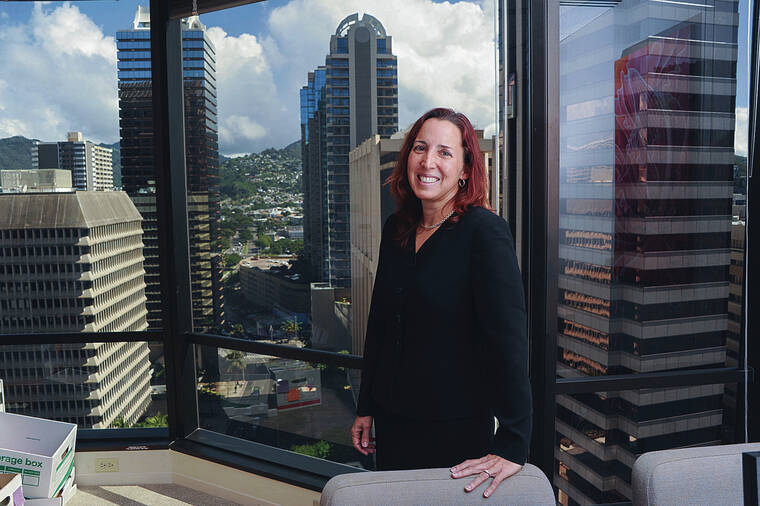Helping people was leading immigration attorney’s passion

STAR-ADVERTISER PHOTO / 2013
Honolulu immigration attorney Clare Hanusz, shown in her downtown office, was one of the state’s top experts on asylum law and policy.
Honolulu immigration attorney Clare Hanusz didn’t become a lawyer to get rich.
“Her mission in life was helping people,” said former law colleague John Robert Egan. “She was very good at it.”
Hanusz, 54, who died Friday at her Honolulu home following a two-year battle with breast cancer, was a passionate advocate for immigrants in Hawaii and worked a number of high-profile cases over the years.
Hanusz was one of the state’s top experts on asylum law and policy, and frequently appeared in the media to explain the complex and politically charged subject.
Born Clare Marie Hanusz in Toledo, Ohio, she would eventually land in Hawaii in 1995 after her husband, Nevzat Soguk, was hired as a political science professor at the University of Hawaii at Manoa.
Hanusz, who studied political science and Latin American studies as a student at Ohio University and traveled extensively in Central America, entered the UH law school in 1996 and specialized in immigration law.
Don't miss out on what's happening!
Stay in touch with breaking news, as it happens, conveniently in your email inbox. It's FREE!
After graduation in 1999, she worked for various nonprofits and law firms before opening her own law practice, Aloha Immigration, in 2017, representing scores of immigrants seeking to become citizens and legal residents — or avoid deportation.
One of her most high- profile cases saw her represent farmworkers from Thailand in a criminal case against the owners of a local farming company accused of illegally importing and abusing the workers. That case ended in 2011.
Egan, former director of the UH Refugee & Immigration Law Clinic, said he and Hanusz collaborated at times on issues and shared strategies over the years. They also helped to set up a new nonprofit, the Legal Clinic, devoted to justice for low-income immigrants and migrants in Hawaii.
“Clare had a long history of being involved in extending legal services to immigrants. She was still active even in private practice. You could always count on her to take a case pro bono (without compensation),” he said.
Hanusz was honored by the ACLU of Hawaii for her volunteer work at the Hawaii State Bar Association’s Pro Bono Celebration in 2017. She was also volunteer attorney for the Citizenship Workshop organized by Local 5 Union in 2018 and 2019.
“She was the kind of lawyer that we thought we ought to be but rarely achieved it like she did,” Egan said.
Soguk, Hanusz’s husband, called his wife “a force of nature and infinite goodness.”
“She was a role model for a lot of people, even me,” he said. “She was devoted to changing the world — even if it was a little at a time. She just never gave up.”
Hanusz and her children, Alissandro and Derya, were part of the group that occupied Gov. Linda Lingle’s office after the governor cut 17 days from the 2009-10 school year as a budgetary cost-cutting measure.
Soguk said his wife took their kids to the Martin Luther King Day parade every year. And one time, he said, she met a family living in a van and came home saying she wanted to give them money. She then found $300 to $400 and took it to the homeless family.
“This was not rare in her life,” Soguk said. “She talked the talk and walked the walk — without running out of energy.”
UH mathematics professor Monique Chyba met Hanusz while both were living at UH faculty housing in Manoa in 2002. They had children of similar age and became good friends.
“She was an extraordinary person,” Chyba said. “She was here to save the world, and her whole life was about helping other people. She made me a better person.”
Hanusz continued to advocate for people well after being diagnosed with cancer in December 2020 and throughout what her family described as an often brutal course of treatment. Hanusz maintained a sunny disposition despite the pain, her husband said.
In a final act of her charity, she chose to donate her body to UH’s John A. Burns School of Medicine to further medical research. Chyba said she knows it’s common to glorify a person’s character and deeds just after they die.
“In this case she really is extraordinary,” she said. “She was really somebody to the end working for the people who needed her.”
The family will hold a celebration of life March 19, which would have been Hanusz’s 55th birthday. Send an email to celebrateclarehanusz@gmail.com for details.
In lieu of flowers, the family asks that contributions be made in Hanusz’s memory to Kesem Berkeley (donate.kesem.org/fundraiser/4211322 Opens in a new tab), The Legal Clinic (thelegal Opens in a new tabclinichawaii.org/donate Opens in a new tab) and Parents for Public Schools — Hawai‘i (ppshi.org/donate Opens in a new tab).




